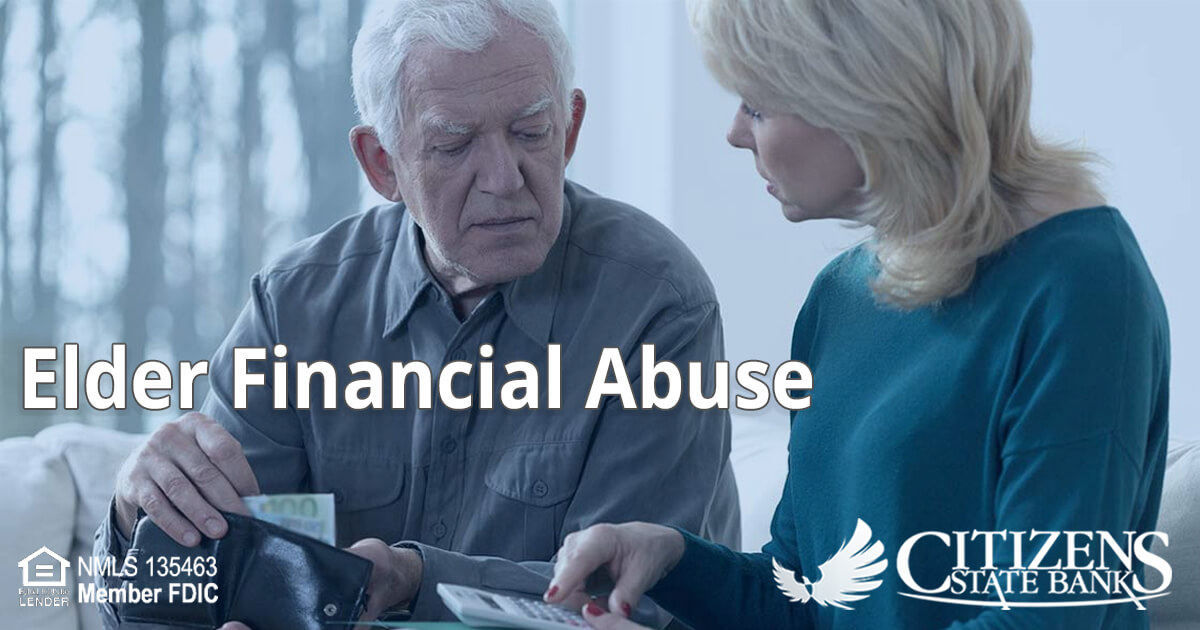Elder Financial Exploitation
August 19, 2019 •Money Smart for Older Adults/FDIC.gov

 The Older Americans Act defines elder financial exploitation quite broadly, as “the fraudulent or otherwise illegal, unauthorized, or improper act or process of an individual, including a caregiver or fiduciary, that uses the resources of an older individual for monetary or personal benefit, profit, or gain, or that results in depriving an older individual of rightful access to, or use of, benefits, resources, belongings, or assets.”
The Older Americans Act defines elder financial exploitation quite broadly, as “the fraudulent or otherwise illegal, unauthorized, or improper act or process of an individual, including a caregiver or fiduciary, that uses the resources of an older individual for monetary or personal benefit, profit, or gain, or that results in depriving an older individual of rightful access to, or use of, benefits, resources, belongings, or assets.”
Anyone can be the victim of financial exploitation. Financial exploitation crosses all social, educational, and economic boundaries. Let’s look at some circumstances and conditions, especially in combination that can make an older adult more vulnerable to financial exploitation. Some older adults may:
- Have regular income and accumulated assets
- Be trusting and polite
- Be lonely or socially isolated
- Be vulnerable due to grief from the loss of a spouse, family member, friend or pet
- Be reluctant to report exploitation by a family member, caregiver or someone they depend on.
- Be dependent on support from a family member or caregiver to remain independent.
- Be receiving care from a person with substance abuse, gambling or financial problems or mental health issues.
- Fear retaliation by the exploiter
- Be unfamiliar with managing financial matters
- Be dependent on a family member, caregiver or another person who may pressure them for money or control of their finances.
Some examples of financial exploitation are:
- Exploitation by an agent under a power of attorney or person in another type of fiduciary relationship
- Theft of money or property, often by a family member, caregiver or in-home helper
- Investment fraud and scams, including deceptive “free-lunch seminars” selling unnecessary or fraudulent financial services or products
- Lottery and sweepstakes scams
- Grandparent/imposter scams
- Tax and debt collection scams
- Charity scams
- Scams by telemarketers, mail offers or door-to - door salespersons.
- Computer and internet scams
- Identity theft
- Reverse mortgage fraud
- Contractor fraud and home improvements scams
Who are the exploiters/abusers?
- Family members and caregivers
- Friends, neighbors or acquaintances
- Agents under a POA or others with legal authority to manage a person’s money
- Telephone and mail scammers
- Fraudulent debt collectors
- Financial advisors
- Internet scammers
- Home repair contractors
- Medicare scam operators
- Other persons known or unknown to the older adult
Often older adults do not report financial exploitation due to the following factors:
- Shame and embarrassment – they do not want to admit they have been exploited
- Loyalty – reluctant to report a family member, caregiver or other person who may treat them well in other ways.
- Fear of Retaliation – they fear not being believed or losing their independence by being declared incompetent and moved into a “nursing home”.
- Denial – often they are unwilling or unable to acknowledge that financial exploitation is or has happened to them.
- Self-blame – abuse of this nature can erode an older person’s self-esteem and some victims may believe they deserve or have caused the abuse.
- Lack of awareness – often victims are unaware that they are being exploited, or don’t know to whom they can report financial exploitation.
- Dependence – victims may be dependent on the abuser for care and assistance.
What should you do if you or someone you know becomes a victim of financial exploitation or another form of elder abuse?
- Contact Adult Protective Services, which is generally a part of your county or state department of social services. Information about reaching your local Adult Protective Services office is available at the Eldercare Locator at eldercare.gov, a public service provided by the U.S. Administration for Community Living, or by calling 1-800-677-1116. If the older person is in danger or you believe a crime has been committed, call 911 for an immediate response from the police. For cases of identity theft, contact your local police and the Federal Trade Commission (FTC) at 1-877-438-4338 or identitytheft.gov. If the loss involves funds held in a financial institution, such as a bank or credit union, report the problem to the financial institution immediately. For more information, go to consumerfinance.gov/askcfpb.
The views, information, or opinions expressed in this article are solely those of the author and do not necessarily represent the views of Citizens State Bank and its affiliates, and Citizens State Bank is not responsible for and does not verify the accuracy of any information contained in this article or items hyperlinked within. This is for informational purposes and is no way intended to provide legal advice.
